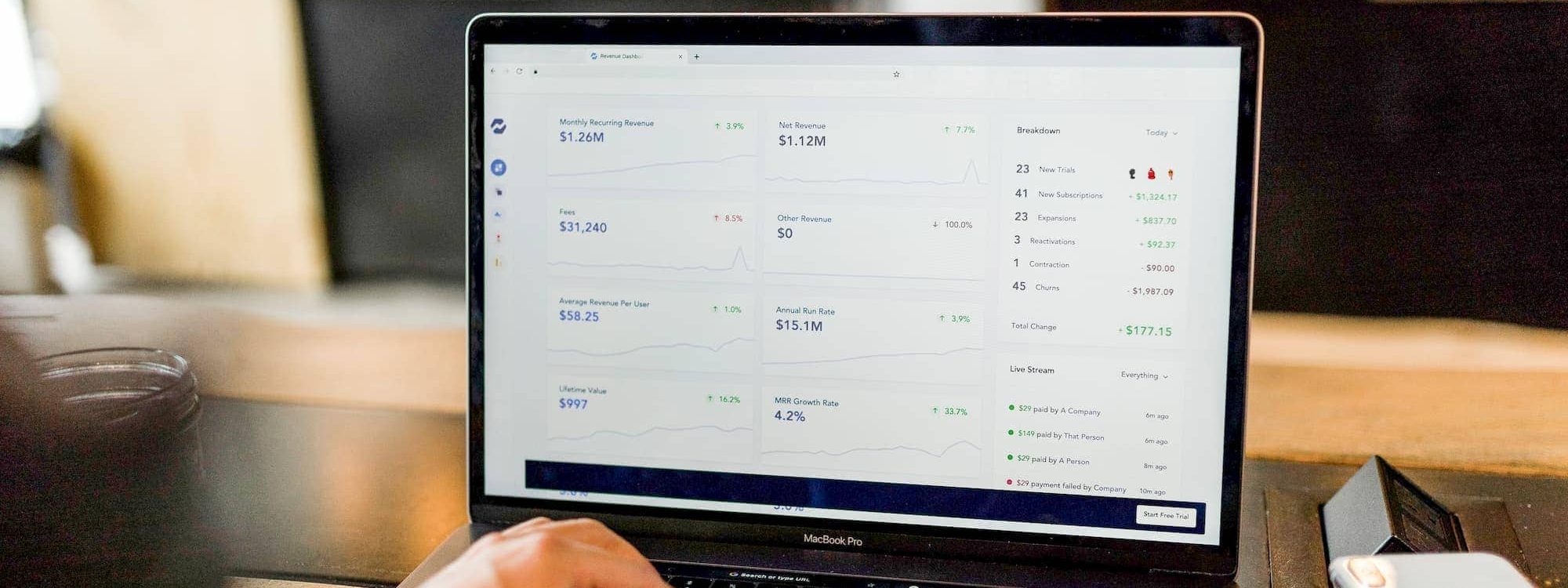6th August 2023
How much does an ecommerce website cost in the UK?

Ecommerce websites can vary drastically in price, depending on what’s included. In this article, we break down the average cost of an ecommerce website in the UK and what you can expect to pay.
If you’re new to ecommerce website costs, consider your project like buying a new car. You have so many models, configurations, and options to select from. There are different types of car, engines, colours, finishes, and more. You could go crazy with a super car that has everything you could dream of, or you could go for something that will get you from A to B at a low cost. Just like buying a car, the cost of an ecommerce website is highly dependent on your budget, your must-have features, requirements, and the supplier you choose.
If you are considering starting an ecommerce website, one of the first challenges you’ll face is figuring out the cost of the ecommerce website based on what you need for your business.
Ecommerce website development projects have many elements and options, and prices different around the world. As a result, there isn’t a one size fits all approach when it comes to costing up a project, but in this article, we will be looking at and giving brought figures for the different costs of an ecommerce website you are likely to encounter.
Typically, when you contact a web design agency, they’ll first give you a ballpark figure or estimate for your ecommerce website project. However, they can be quite vague and sometimes far from the actual sum you end up paying for your ecommerce website.
Any ecommerce web design agency worth their salt will take you through various questions to drill down into the specific details of your ecommerce project. They will do this to ensure that they’re able to give you a detailed, more accurate quote for your new online store.
How much does an ecommerce website cost in the UK in 2025?
A typical small ecommerce website costs between £2,000 and £20,000. However, you should research and discuss your ecommerce project to with an agency to get an accurate estimate.
Contact our ecommerce website experts to get an estimate.
That’s not to say that an ecommerce website can’t cost less or more. A very budget-friendly online shop using a pre-made style could end up costing you under £2,000. On the other end of the spectrum, you might be like some of our clients who process thousands of transactions per day. The architecture, complexity and reliability that’s involved with this type of project will easily surpass £20,000.
Here’s an example breakdown of the total cost of an ecommerce website for a small or medium business with fairly common features. This type of website is generally capable of processing up to a few hundred thousand pounds in transactions per year. The cost breakdown includes estimated subscriptions and additional costs:
| Service | Cost |
|---|---|
| Ecommerce Design & Development | £2,000 – £20,000 (one-off) |
| Support & Maintenance | £80 – £800 (per month) |
| Web & Email Hosting | £20 – £600 (per month) |
| Photography | £300 – £1,500 (per photoshoot) |
| Copywriting | £240 – £800 (per day) |
Get an accurate quote for your ecommerce project:

Specify your ecommerce needs
First and foremost, you should be thinking about the things that you absolutely must have to make your ecommerce website a success. You should then have a different list of things that would be nice to have, but you don’t necessarily need on your ecommerce store, and also a list of things that you want to work towards and would automate the website for yourself and your customers.
A quick and easy way to do this is by firing up a text editor and outlining all these details. If you have a document ready, you can send it to the web design company and make it a lot easier for them to give you a more accurate cost for your ecommerce project.
A custom or off-the-shelf ecommerce approach?
What’s the difference? A custom (or bespoke) ecommerce website is one that’s made entirely from scratch. You’ll be the only person to use that website, and no one else will have one like it. On the other hand, you can purchase an off-the-shelf site that was developed for this purpose. All that’s left to do is to populate it with content and make minor style changes.
Using an off-the-shelf theme has implications both on design and development. Which option you choose will also have a considerable impact on the cost of your ecommerce project.
Here’s a breakdown, taking into account both options.
Design
Some ecommerce platforms allow you to buy themes so that you can get your store started quickly. While we don’t really recommend this approach, it can be a good option if you want to get an ecommerce website up and running quickly. An off-the-shelf theme is also ideal if you have limited funds or if you don’t have any custom functionality requirements.
If you want to create a serious ecommerce business that has a strong foundation or you are already established, we recommend that you invest in a bespoke design that embodies what your ecommerce website is all about. This makes your brand and website instantly recognisable and perfectly in line with your values, which helps you to build a stronger connection with your clients going forward.
Development
You can also find off the shelf themes with generic designs if you are just interested in standard ecommerce functionality. Since the theme is already completed, you won’t have to wait weeks for development to be completed.
However, if you want bespoke designs, you’ll likely need to hire a UK ecommerce website design company which can meet your unique ecommerce design and development requirements. With a bespoke ecommerce website, you’ll be able to dictate what features your website has. Thus, allowing you to implement time and cost-saving functionality that you cannot do with a pre-made theme.
Off-the-shelf themes are made for the mass market. Because of this, they have a ton of options and styles that you won’t necessarily use, but they still need to be loaded. With this approach, pre-made themes are often slow and not search engine optimised.
Additionally, another drawback of a pre-made theme is that it’s not optimised for your specific use case. It may turn out that you’ll need to pay a web designer to make any changes to the theme, bringing it close to the cost of a bespoke store.
Additional ecommerce website costs to keep in mind
Ecommerce website design is quite complicated, and there are many additional costs that you’ll need to keep in mind. To make it easy, we have included these below, alongside how much you can expect to pay.
Web Hosting
The cost of web hosting for an ecommerce website will vary, depending on the total amount of traffic your website is expected to receive and how many transactions you are processing. Most hosting companies charge a monthly or annual hosting fee for ecommerce websites. This typically starts at £240 per year for a small ecommerce site.
If you own a large, established ecommerce site, or are expecting to use a lot of images, you may require a larger server that’s exclusive to you. Dedicated hosting will cost more than this estimation. Larger ecommerce stores and marketplaces may spend hundreds of thousands or millions of pounds on their hosting each year. Depending on the size and number of transactions on your ecommerce website, this could very easily surpass the cost of your initial website build cost.
SSL Certificates
You’ll need an SSL certificate if you want to make your website more secure and give your customers more confidence to make a purchase. An SSL certificate gives your website the green padlock icon and “https” prefix in the address bar, which is a big trust boost for clients.
An SSL certificate also helps to keep your information private between your website and the visitor, since it makes the information unreadable to everyone apart from the server you send the information to.
Some UK ecommerce web design companies charge for SSL certificates, but there are plenty of secure free options. For example, we use Cloudflare and LetsEncrypt to optimise and secure client websites. There are situations where an Extended Validation (EV) SSL certificate may be required – ask our ecommerce experts.
Updates, bug fixes and backups
Although it’s optional, you should factor in around £50 to £150 every month for maintenance and security for your new ecommerce website.
Most ecommerce platforms receive updates, as do any plugins or extensions. These improvements can cause problems that need to be solved to ensure little or no downtime, while also guaranteeing that you have the latest features and security updates. If you don’t update your plugins, your ecommerce website is left vulnerable and at risk of getting hacked.
Some web design agencies offer maintenance packages that also include additional security fixes and off-site backups included in the price. Be sure to ask them before committing to a company for maintenance, and keep in mind that you don’t have to use the same company as the one who made your website.
Search engine optimisation
SEO is one of the biggest things that should be considered and discussed in great detail at the very beginning. The first thing you need to ask your ecommerce website design company is how much they charge for SEO on an ongoing basis, as SEO is an area that’s always changing. You might rank high on your keywords today, but rank low next week if you fail to adjust your SEO strategy to Google’s regular algorithm updates. As such, you’ll need to include ongoing SEO services in your initial budget.
Training
Running an online shop can be hard, especially if you are non-technical or unfamiliar with the ecommerce platform used by your design agency.
Not many people know how to manage their new ecommerce website properly. If you know you fall into this category, you will need some training and documentation to show you how to manage your website, edit content, add new products, and other day-to-day tasks.
Even if you know the ecommerce platform well from a different website you use, it might be that your new site has different features or your ecommerce design agency has a different technique to display settings.
Some design companies will charge you extra for training when building your ecommerce website, so be sure to clarify beforehand. Ideally, this should be included in the cost of your ecommerce website.

Migrating your products and clients
If you already own an ecommerce website, you’ll need to think about how you will move from the current website to your new ecommerce website. Being a critical task, it must be done smoothly so that there’s no downtime and to make it as easy as possible for your clients with little or no disruption to sales, past order records and user accounts.
Make sure that you are confident that the web design company you choose will be able to do this successfully so that you don’t lose any past orders or customer details.
We have extensive experience in migration, backups and disaster recovery. Call us on 0117 205 0050 to discuss merging or migrating your data.
Improving business processes
After having your ecommerce site redesigned and redeveloped, this is the best time to look at some ways in which you streamline business processes. For instance, what accounting package does your website use? Do you use MailChimp for email marketing? Does your website use a CRM system? Incorporating these types of third-party platforms can help you to improve your business processes and cut down on administrative duties.
Design agencies should discuss this with you so that you can think about integrating tools that you already use with your site. There are plenty of free integrations out there, so you may find that you’ll be saving a lot of time for no additional cost.
How long does it take to build an ecommerce website in the UK?
It may take anywhere from 2 to 6 months to build a small ecommerce website. Larger projects or more complex requirements may push the timeline to a year.
Creating an ecommerce site from scratch or redesigning your existing one is a huge undertaking. Do not be fooled by salespeople who say that your new website will be delivered in two weeks. A quality ecommerce website built by a UK-based website design company will take time and effort to build.
You’ll need to ensure that you have realistic expectations and that your web design company is honest with you about when your website will be delivered.
Get in touch today to discuss your ecommerce project.
Tips for getting an accurate ecommerce website cost
1. Make sure you get all the functionality documents
You should always ensure that the web designer you hire to build your new ecommerce site produces a detailed document outlining all the features and functionality you require. This ensures that nothing is forgotten or left to chance; since it’s all documented, you can check off each item from the list once the web developer does a task. These documents also ensure that you never pay extra for things that were never agreed upon initially.
2. Speak to several web design agencies
When you are ready to have your ecommerce website built, you should ensure that you consult two or three website design agencies to get their ideas on how they’d handle your inquiry. During this enquiry process, you should get a good feel of how good and thorough they are.
During the initial dealings, you will also get an idea of what to expect from them in terms of customer service. Request that they calculate a quote for your project and move on from there.
3. Don’t necessarily choose the cheapest option
If you go to several ecommerce design companies, you will get a range of different prices. You may be tempted to pick the cheapest option immediately but this could easily end up having undesirable results.
If a low price is how you measure success, then the cheapest option could work for you. However, if you want a quality ecommerce website that’s reliable, fast and secure, you may need to make a slightly larger initial invest.
Remember that this will be the beginning of a long term partnership so you better make sure that you commit to terms and an ecommerce design agency that you will be happy with.
Get a quote for the cost of your ecommerce website
There are so many little things that can affect the cost of an ecommerce website. If you would like a quote, advice or have any questions, we are ready to help.
Whether you are interested in starting a new ecommerce website or redesigning your existing site, get in touch or call us on 0117 205 0050.
Related Posts


